4BM3U3单元备课教案
4BUnit3Lookandsee单元教学设计新部编版
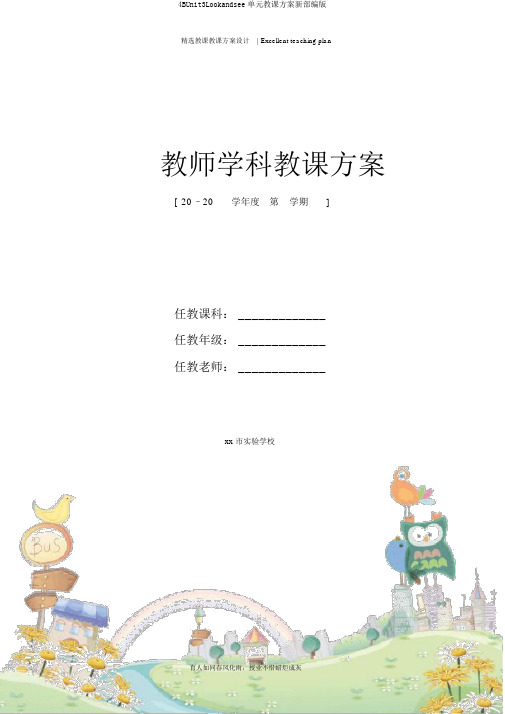
精选教课教课方案设计| Excellent teaching plan教师学科教课方案[ 20–20学年度第__学期]任教课科: _____________任教年级: _____________任教老师: _____________xx市实验学校精选教课教课方案设计| Excellent teaching planUnit 3 Look and see单元教课方案备课人:锦绣苑小学刘晓燕讲课时间:年月日-年月日1.单元内容整体描绘:本单元的话题是Look and see,主要从视觉的角度,体现了一天中太阳的升落,以及影子长短的变化,学习一般此刻时的表达运用,体现了一般此刻时动词第三人称单数的变化,特别要提示学生注意动词词尾变化后的形式以及读音变化。
2.本单元有关的教课内容剖析:功能:描绘自然现象话题: Look and see语言知识:3A Unit 6 Me This is me. I short’m. My hair is long.3B Unit6 Food and drinks Learn the sounds:单Flora ’ s favourite food is fish. She likes it very much.元She eats five for her breakfast.整4A Unit1Meeting new Good morning! Good afternoon!体people曾拓展: Good evening! Good night!分Unit10Around my There ’ s a park behind my home.析homeUnit 11 Shapes How many shapes are there in the picture?本单元将持续学习一般此刻时、形容词和时间短语的表达与运用。
3.本册教材与此有关的内容剖析:Unit 5 Sport 一般此刻时She likes playing table tennis.Unit 7 My day Listen and say 中出现了一般此刻时Kitty g ets up at seven o’ clock.Kitty goes to school / brushes her teethEnjoy a story 中出现时间短语in the morning, in the evening学生对太阳早升晚落的规律早已了解,在学习汉语儿歌《影子》以及自然常识的基础上,对早午晚影子长短变化规律已有必定的认识,对词组 in the morning /in the evening 以及形容词 long / short 已有必定的学习基础,初步掌握这些词汇的学一些平时用法,能在详细语境顶用这些词汇做简单的描绘。
牛津英语4bM3U3 Days of the week 说课稿
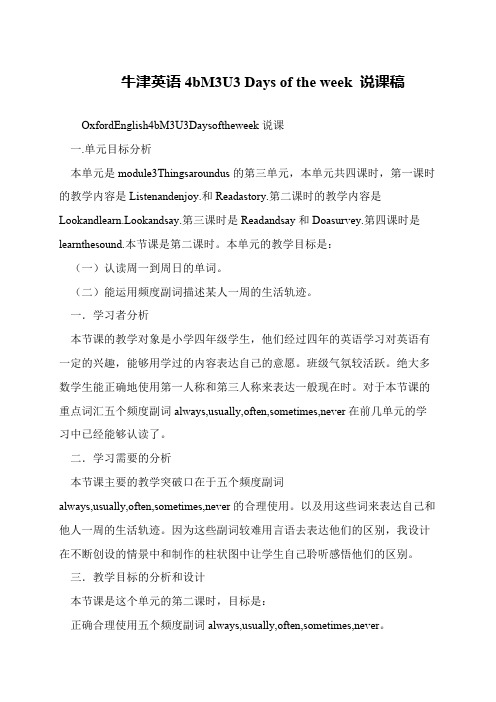
牛津英语4bM3U3 Days of the week 说课稿
OxfordEnglish4bM3U3Daysoftheweek说课
一.单元目标分析
本单元是module3Thingsaroundus的第三单元,本单元共四课时,第一课时的教学内容是Listenandenjoy.和Readastory.第二课时的教学内容是Lookandlearn.Lookandsay.第三课时是Readandsay和Doasurvey.第四课时是learnthesound.本节课是第二课时。
本单元的教学目标是:
(一)认读周一到周日的单词。
(二)能运用频度副词描述某人一周的生活轨迹。
一.学习者分析
本节课的教学对象是小学四年级学生,他们经过四年的英语学习对英语有一定的兴趣,能够用学过的内容表达自己的意愿。
班级气氛较活跃。
绝大多数学生能正确地使用第一人称和第三人称来表达一般现在时。
对于本节课的重点词汇五个频度副词always,usually,often,sometimes,never在前几单元的学习中已经能够认读了。
二.学习需要的分析
本节课主要的教学突破口在于五个频度副词
always,usually,often,sometimes,never的合理使用。
以及用这些词来表达自己和他人一周的生活轨迹。
因为这些副词较难用言语去表达他们的区别,我设计在不断创设的情景中和制作的柱状图中让学生自己聆听感悟他们的区别。
三.教学目标的分析和设计
本节课是这个单元的第二课时,目标是:
正确合理使用五个频度副词always,usually,often,sometimes,never。
译林版四年级英语4Bunit3精品教案
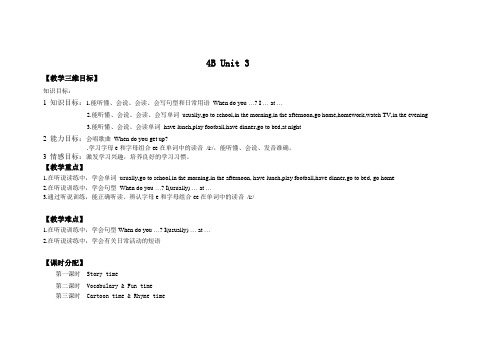
4B Unit 3【教学三维目标】知识目标:1 知识目标:1.能听懂、会说、会读、会写句型和日常用语When do you …? I … at …2.能听懂、会说、会读、会写单词usually,go to school,in the morning,in the afternoon,go home,homework,watch TV,in the evening3.能听懂、会说、会读单词have lunch,play football,have dinner,go to bed,at night2 能力目标:会唱歌曲When do you get up?.学习字母e和字母组合ee在单词中的读音/i:/,能听懂、会说、发音准确。
3 情感目标:激发学习兴趣,培养良好的学习习惯。
【教学重点】1.在听说读练中,学会单词usually,go to school,in the morning,in the afternoon, have lunch,play football,have dinner,go to bed, go home2.在听说训练中,学会句型When do you …? I(usually) … at …3.通过听说训练,能正确听读、辨认字母e和字母组合ee在单词中的读音/i:/【教学难点】1.在听说训练中,学会句型When do you …? I(usually) … at …2.在听说读练中,学会有关日常活动的短语【课时分配】第一课时 Story time第二课时 Vocabulary & Fun time第三课时 Cartoon time & Rhyme time第四课时 Sound time, Checkout time, Ticking time & Happy Reading 第五课时 Practice & Revision【主备人】。
江苏省译林英语4B4B Unit3教案
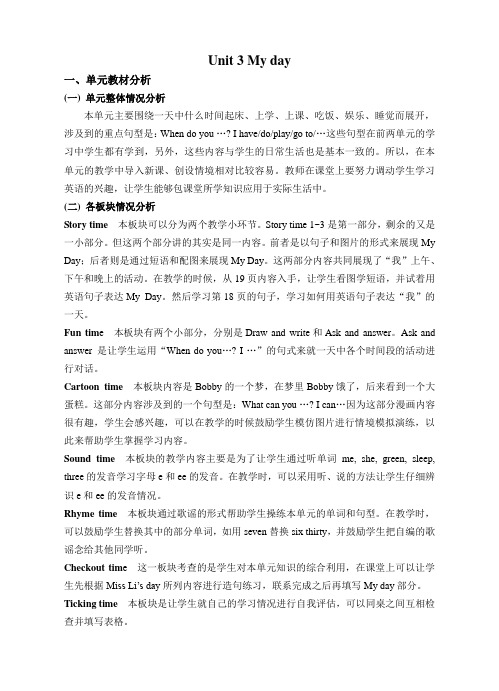
Unit 3 My day一、单元教材分析(一) 单元整体情况分析本单元主要围绕一天中什么时间起床、上学、上课、吃饭、娱乐、睡觉而展开,涉及到的重点句型是:When do you …? I have/do/play/go to/…这些句型在前两单元的学习中学生都有学到,另外,这些内容与学生的日常生活也是基本一致的。
所以,在本单元的教学中导入新课、创设情境相对比较容易。
教师在课堂上要努力调动学生学习英语的兴趣,让学生能够包课堂所学知识应用于实际生活中。
(二) 各板块情况分析Story time本板块可以分为两个教学小环节。
Story time 1~3是第一部分,剩余的又是一小部分。
但这两个部分讲的其实是同一内容。
前者是以句子和图片的形式来展现My Day;后者则是通过短语和配图来展现My Day。
这两部分内容共同展现了“我”上午、下午和晚上的活动。
在教学的时候,从19页内容入手,让学生看图学短语,并试着用英语句子表达My Day。
然后学习第18页的句子,学习如何用英语句子表达“我”的一天。
Fun tim e 本板块有两个小部分,分别是Draw and write和Ask and answer。
Ask and answer 是让学生运用“When do you…? I …”的句式来就一天中各个时间段的活动进行对话。
Cartoon time本板块内容是Bobby的一个梦,在梦里Bobby饿了,后来看到一个大蛋糕。
这部分内容涉及到的一个句型是:What can you …? I can…因为这部分漫画内容很有趣,学生会感兴趣,可以在教学的时候鼓励学生模仿图片进行情境模拟演练,以此来帮助学生掌握学习内容。
Sound time本板块的教学内容主要是为了让学生通过听单词me, she, green, sleep, three的发音学习字母e和ee的发音。
在教学时,可以采用听、说的方法让学生仔细辨识e和ee的发音情况。
M3U3教案
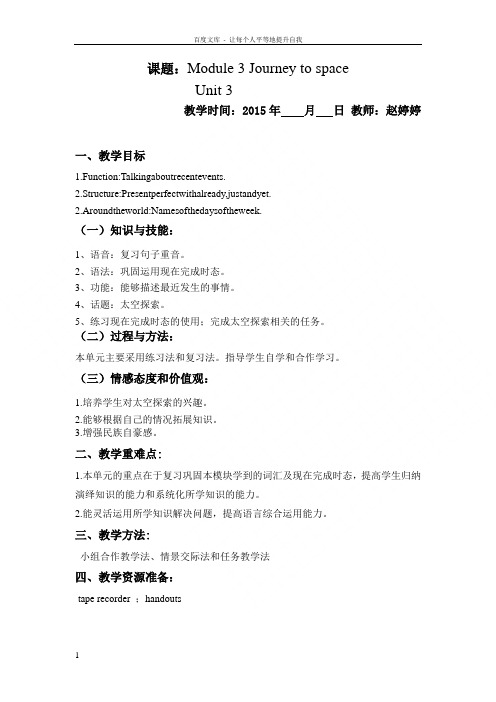
课题:Module 3 Journey to spaceUnit 3教学时间:2015年月日教师:赵婷婷一、教学目标1.Function:Talkingaboutrecentevents.2.Structure:Presentperfectwithalready,justandyet.2.Aroundtheworld:Namesofthedaysoftheweek.(一)知识与技能:1、语音:复习句子重音。
2、语法:巩固运用现在完成时态。
3、功能:能够描述最近发生的事情。
4、话题:太空探索。
5、练习现在完成时态的使用;完成太空探索相关的任务。
(二)过程与方法:本单元主要采用练习法和复习法。
指导学生自学和合作学习。
(三)情感态度和价值观:1.培养学生对太空探索的兴趣。
2.能够根据自己的情况拓展知识。
3.增强民族自豪感。
二、教学重难点:1.本单元的重点在于复习巩固本模块学到的词汇及现在完成时态,提高学生归纳演绎知识的能力和系统化所学知识的能力。
2.能灵活运用所学知识解决问题,提高语言综合运用能力。
三、教学方法:小组合作教学法、情景交际法和任务教学法四、教学资源准备:tape recorder ;handouts五、课时设计:一课时六、教学过程教学环节教师活动学生活动设计意图激情导入Step One: Warming-upFree talk something about space.Studentstalkaboutsomethingaboutspace.To arousethestudents’interest inlearning thenew lesson.复习巩固拓展延伸回归主题Step Two: Revision and practiceA: Revise the words space.B: Revise the grammar:the Present PerfectTenseC: Finish Activity1-7Step Three: Listening, speaking and learningA: Listen and answer.B. Learn around the world.Step Four: Module taskMake a poster about space travel. .Studentsrevise thewords andthegrammar.Studentslisten andanswerStudentsmake aposteraboutspacetravel.To help thestudents tomaster thevocabularyand thegrammarTo learnmoreknowledgeaboutDisneyland.To improvethestudents’ability ofusinglanguageskills.教师小结 1.强化无规则动词过去分词的记忆。
八年级英语教案:集体备课教案M3U3
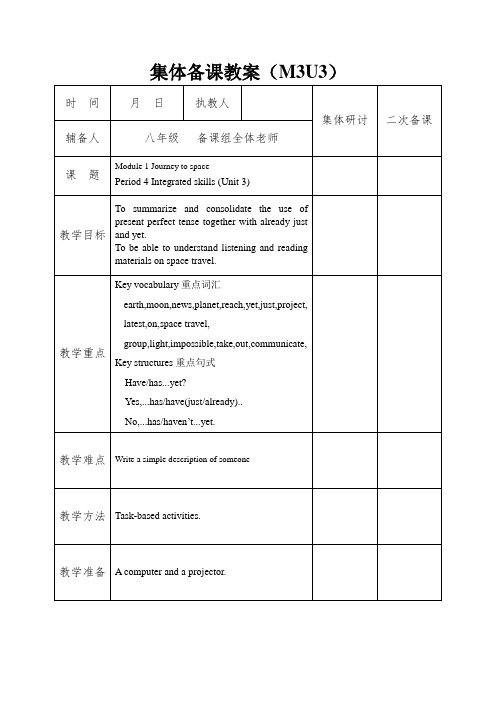
时 间
月 日
执教人
集体研讨
二次备课
辅备人
八年级 备课组全体老师
课 题
Module 1Journey to space
Period 4Integratedskills(Unit3)
教学目标
To summarize and consolidate the use of present perfect tense together with already just and yet.
The spaceship has just...
The spaceship hasn't...because...
We have just discovered...on Mars.
We have...because...
We haven't...yet because...
They have already...but...
板书设计
the solar system--the Galaxy--the universe
--Has/Have...yet?
--Yes, ...has/have.(...has/have just/already...)
--No,...hasn't./haven't.(...hasn't/haven't...yet.) Nhomakorabea教学方法
Task-based activities.
教学准备
Acomputerand a projector.
教学过程
Step I Revision
DoActivity2on page22.
T:Look at thesentences and try to choose the correct answers.
牛津小学英语4B Unit3备课资料教案

Unit 3 What’s your job一、教学要求1.能听懂、会说、会读和会拼写a policeman, a policewoman, a waiter, a waitress, a driver,a worker, a farmer, a cook.2.能听懂、会说、会读日常交际用语It’s cold today, isn’t itWhat do you want to be I want to be…3.能听懂、会说、会读和会写句型What’s your/his/her job I’m/He’s/She’s a…What are their jobs They’re …How old are you/is he/she I’m/He’s/She’s …4.了解字母组合dr, tr在单词中的读音5.会唱歌曲 They sing happily.二. 单元教材分析本单元主要围绕“谈论人物”这一话题展开教学,主要涉及询问有关人物姓名What’s your name年龄How old are you/is he/she职业What’s your/his/her job等。
在教学时教师应注意创设日常生活的情景。
本单元出现了不少职业类单词,教师应重点思考采用多种生动活泼的方法来教授这些单词。
三、教学重点1.能听懂、会说、会读和会拼写a policeman, a policewoman, a waiter, a waitress, a driver, a worker, a farmer, a cook.2.能听懂、会说、会读日常交际用语It’s cold today, isn’t itWhat do you want to be I want to be…3.能听懂、会说、会读和会写句型What’s your/his/her job I’m/He’s/She’s a…What are their jobs They’re …How old are you/is he/she I’m/He’s/She’s …4.了解字母组合dr, tr在单词中的读音5.会唱歌曲 They sing happily.四、教学难点1.能听懂、会说、会读和会拼写a policeman, a policewoman, a waiter, a waitress, a driver, a worker, a farmer, a cook.2.能听懂、会说、会读日常交际用语What do you want to be I want to be…3.能听懂、会说、会读和会写句型What’s your/his/her job I’m/He’s/She’s a…What are their jobs They’re …How old are you/is he/she I’m/He’s/She’s …Unit 3 (第一课时)一、教学内容B Look, read and learn &C Ask and answer & Song .二、教学目标1. 能听懂、会说、会读和会拼写a policeman, a policewoman,a waiter, a waitress, a driver, a worker, a farmer,a cook.2. 能听懂、会说、会读和会写句型:What’s your/his/her job I’m/He’s/She’s a… What are their jobs They’re …三、教学重点1. 能听懂、会说、会读和会拼写a policeman, a policewoman,a waiter, a waitress, a driver, a worker, a farmer,a cook.2. 能听懂、会说、会读和会写句型:What’s your/h is/her jobI’m/He’s/She’s a… What are their jobs They’re …四、教学难点1、能听懂、会说、会读和会写句型What’s your/his/her jobI’m/He’s/She’s a… What are their jobs They’re …五、教学准备1、教具准备1) 单词卡片2)关于本课时的多媒体课件或人物用物品。
4BM3U3教案(福山外国语小学)
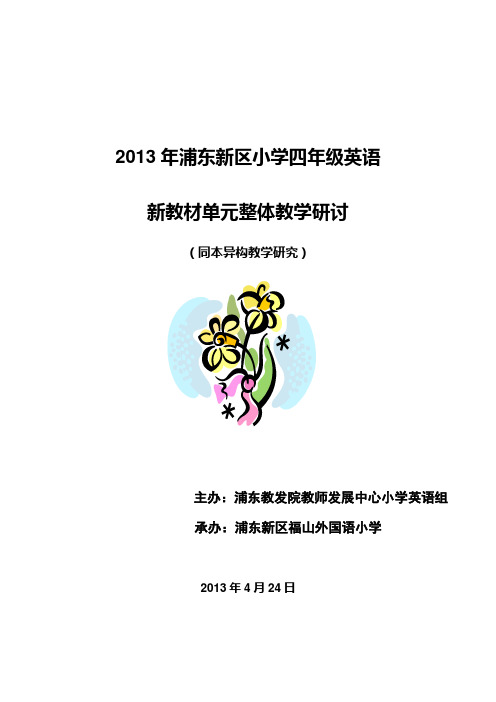
2013年浦东新区小学四年级英语新教材单元整体教学研讨(同本异构教学研究)主办:浦东教发院教师发展中心小学英语组承办:浦东新区福山外国语小学2013年4月24日Teaching Plan for Oxford English (Shanghai Edition)4B M3 U3 Days of the weekTeacher:Ni Jun倪君(福山外国语小学)Tang Jianxia 唐剑霞(福山外国语小学)Book:Oxford English (Shanghai Edition) 4B M3 U3 Days of the weekDate: 2013-04-24Teaching aids: Multi-media, word cards, flash, Work sheet, etc.教学设计说明学生情况分析:四年级学生活泼好动,有着强烈的求知欲与表现欲,对故事学习、对话表演等尤感兴趣。
经过了三年多的英语学习后,他们已经积累了一定的语言知识(包括词汇、语言结构与语法),对身边的人和事物产生着较为浓厚的关注度与兴趣,也具备了一定的听说读写能力。
在学习本单元内容之前,他们已经掌握了一周七天的星期表达,了解了不少场所以及可以进行的相关活动,具备了不同的感官感受;同时,他们也能较为熟练地运用to be、can句型、there be句型、一般现在时态的各种相关句型进行表达与交流。
模块教学任务分析:主题:Things around us单元:Unit 1 Sounds Unit 2 Time Unit 3 Days of the week4B M3的学习主题为Things around us(我们周围的事物)。
这个模块涉及到的词汇包括与声音相关的名词与形容词、频度副词、星期表达、时间类词组以及常见的日常生活类动词词组等;句型与时态包括to be句型、there be句型、一般现在时态(含各种句式)以及重点时态现在进行时态(着重于一般疑问句以及问答、特殊疑问句以及回答)。
牛津英语上海版四年级下册M3U3 备课教案.doc

2016-04-19 4BM3U3Module3 Things around meU2 Days of the weekI. 词汇1. 核心词汇/词组week Sunday Monday Tuesday Wednesday ThursdayFriday Saturday family weekend middle date busy2. 其他Chinese chess classmate clever day everydaykind love meeting rainbow shy smile todaywhen in the middle of3. 词语解析1) Chinese的意思是中国的;汉语;中国人。
例句:Mrs. Green speaks Chinese very well!Wood likes Chinese food. I’m Chinese. I love China.2) in the middle of(在…中间)是表示位置的介词词组。
Wednesday is in the middle of the wddk.The car is in the middle of the road.[归纳]我们已经学过的介词词组还有:in front of…在…的前面in the centre of…在…的中心The teacher is in the front of the blackboard.Nanjing Road is in the centre of Shanghai.3) clever聪明的,shy(害羞的),kind(友好的)都是用来描写人的形容词。
Mary is clever and she is also a shy and kind girl.4) when是时间疑问词,相当于what timeWhen do you have English class today?重点知识:1. never, usually, often, sometimes, never 是表示频度的副词。
新思维4B第3单元教案
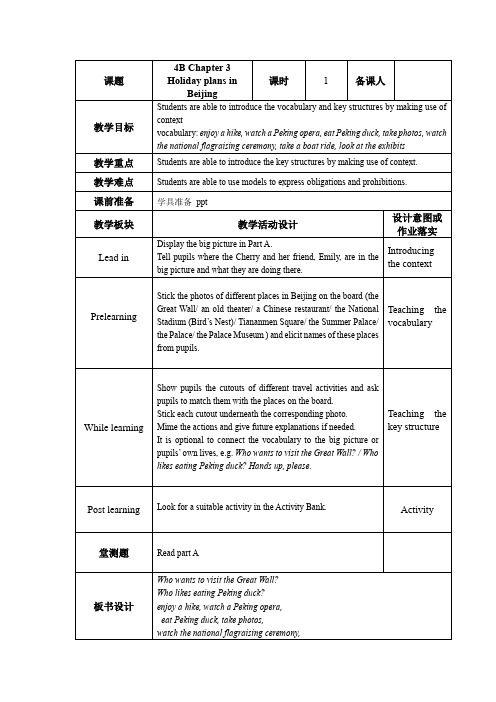
Point at Emily.
Point at Emily’s first speech bubble,
Point at Cherry’s second speech bubble.
Have pupils read the sentence in Emily’s second speech bubble.
课前准备
学具准备ppt
教学板块
教学活动设计
设计意图或作业落实
Lead in
Display the big picture in Part A.
Tell pupils where the Cherry and her friend, Emily, are in the big picture and what they are doing there.
Demonstrating how to use the key structures.
Post learning
Divide the class into two groups.
Stick the picture cards of different places in Beijing on the board. You can add some more places to make the game more fun and challenging.
Pretend to be the camp attendants and read aloud what they say.
Reinforcing the key structure using the context
4B unit3教案
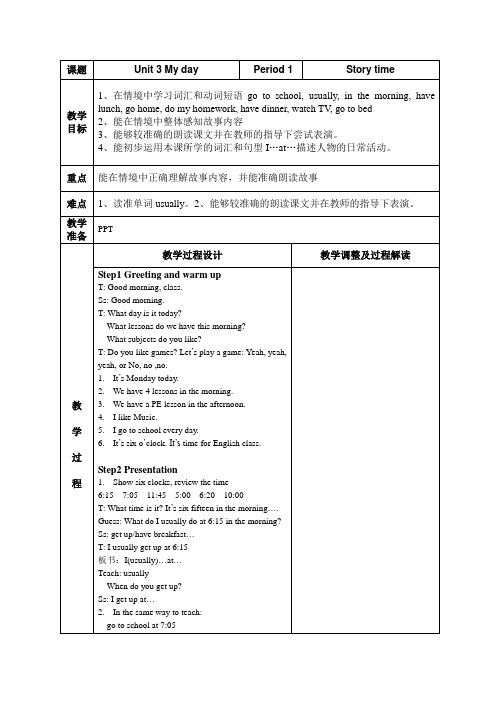
5.I go to school every day.
6.It’s six o’clock. It’s time for English class.
Step2 Presentation
1.Show six clocks, review the time
6:15 7:05 11:45 5:00 6:20 10:00
2、能在情境中整体感知故事内容
3、能够较准确的朗读课文并在教师的指导下尝试表演。
4、能初步运用本课所学的词汇和句型I…at…描述人物的日常活动。
重点
能在情境中正确理解故事内容,并能准确朗读故事
难点
1、读准单词usually。2、能够较准确的朗读课文并在教师的指导下表演。
教学准备
PPT
教
学
过
程
教
学
过
程
板书:I(usually)…at…
Teach: usually
When do you get up?
Ss: I get up at…
2.In the same way to teach:
go to school at 7:05
have lunch at 11:45
go home at 5:00
have dinner at 6:20
Step 4Consolidation
1.Read in three.
2.Act as Mike, choose one part and talk about your activity.(三人一小组,扮演Mike,选择早、中、晚其中一个时间说说自己的活动)
3Talk in groups. Make a new chant, say something about your day.
牛津小学英语4B unit3 教案

Unit 3 What’s your job?本单元教学内容和教学目标:(一). 知识目标:词汇: a policeman, a policewoman , a waiter, a waitress, a driver, a worker, an engineer, a farmer, a postman, a cook. (听、说、读、写四会掌握)句子:A. What’s your / his / her job ?????????????????????I’m / He’s / She’s a / an ….What are their jobs ?They’re ….How old are you / is he / she /I’m / He’s / She’s ….What do you want to be ?I want to be ….It’s cold today, isn’t it ?Guess!(A、B、C根据学生的实际情况尽量要求四会掌握,D 、E、???? F三会掌握)语音: 辅音字母组合dr和tr在单词中的发音. (能听后辨认,会读)歌曲:??They sing happily.(会唱,基本了解歌词大意)(二). 功能目标:学会询问和介绍他人的职业。
学会询问和介绍他人的年龄。
学会表达:我将来想做…。
(职业)二.本单元教学重点: 询问和介绍他人的职业:???????????? What’s your /his / her job ?????????????I’m / He’s / She’s ….?????????? What are their jobs ??????????? They’re ….三.本单元教学难点:语音: 辅音字母组合dr和tr在单词中的发音.反意疑问句的初步了解和使用: It’s cold today, isn’t it ?四.教材分析:????本单元主要围绕“谈论人物”这一话题,主要涉及询问有关人物姓名、年龄、职业和表达自己的理想。
小学四年级下册英语 4bunit3教案 4b unit3
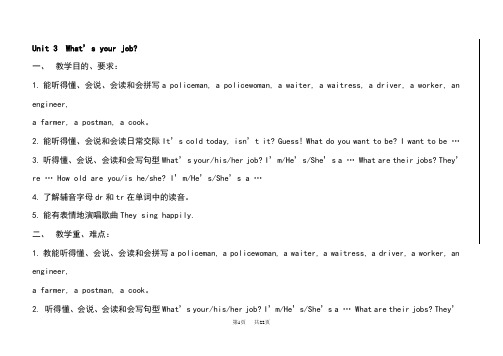
Unit 3 What’s your job?一、教学目的、要求:1.能听得懂、会说、会读和会拼写a policeman, a policewoman, a waiter, a waitress, a driver, a worker, an engineer,a farmer, a postman, a cook。
2.能听得懂、会说和会读日常交际It’s cold today, isn’t it? Guess! What do you want to be? I want to be …3.听得懂、会说、会读和会写句型What’s your/his/her job? I’m/He’s/She’s a … What are their jobs? They’re … How old are you/is he/she? I’m/He’s/She’s a …4.了解辅音字母dr和tr在单词中的读音。
5.能有表情地演唱歌曲They sing happily.二、教学重、难点:1.教能听得懂、会说、会读和会拼写a policeman, a policewoman, a waiter, a waitress, a driver, a worker, an engineer,a farmer, a postman, a cook。
2. 听得懂、会说、会读和会写句型What’s your/his/her job? I’m/He’s/She’s a … What are their jobs? They’第1页共22页re … How old are you/is he/she? I’m/He’s/She’s a …三.教学准备:挂图、录音机、磁带、幻灯片、实物投影机等。
四. 教学进度:6教时第一教时一、教学目的、要求:1. 掌握四会:a policeman, a policewoman, a waiter, a waitress, a driver, a worker, an engineer, a farmer,a postman, a cook二、教学重、难点:1. 掌握不定冠词的用法三、教学准备:挂图、录音机、磁带、幻灯片第2页共22页第3页共22页第4页共22页第二教时一.教学目的、要求:四会:What’s your /his /her job? I’m /He’s /She’s a /an … What are their jobs ? They’re …第5页共22页How old are you /is he /she ? I’m / He’s /She’s …二.教学重、难点:特殊疑问句的用法三.教学准备:录音机、磁带第6页共22页第7页共22页第8页共22页第9页共22页第三教时一.教学目的、要求:四会:What’s your /his /her job ? I’m /He’s /She’s a /an … What are their jobs ? They’re …三会:Guess !二.教学重、难点:第10页共22页your his her their 的用法。
4B Module3 Unit 3 Weather教学设计21

教学重点
四会单词rainy, windy, cloudy, sunny的拼写与四会句型What’s the weather like in…?及In … it is….交际问答的运用。
自我检测:
1.将下列名词变成形容词:
rain—()cloud—()
wind—()snow—()
sunny rainy windy cloudy
2.
What’s the weather like today?
It’s
当堂检测:
Dear Helen
My name is பைடு நூலகம்itty. I am your pen-friend.
I like the seasons inShanghai. I loveShanghai.
1.How many seasons are there inShanghai?
2.What can you see in spring?
3.What’s the weather like in summer in Shanghai?
板书设计
Module3 Unit3 Weather
What’s the weather like in…?
rainy sunny windy cloudy
作业设计
1.用句型What’s the weather like? It’s…描述4季的天气情况。
2.给Kitty写信介绍太原的天气。
达
标
检
测
检测:
I have a brother. I live inShanghai.
- 1、下载文档前请自行甄别文档内容的完整性,平台不提供额外的编辑、内容补充、找答案等附加服务。
- 2、"仅部分预览"的文档,不可在线预览部分如存在完整性等问题,可反馈申请退款(可完整预览的文档不适用该条件!)。
- 3、如文档侵犯您的权益,请联系客服反馈,我们会尽快为您处理(人工客服工作时间:9:00-18:30)。
English 4B (Oxford Shanghai Edition)
Module 3 Unit 3
Theme:Days of the week
School: 育红小学
Teacher: 王韵清
I、单元教学目标
A. Language knowledge (语言知识):
1、能正确朗读、拼写星期单词Monday—Sunday,了解并学会运用词组on weekdays, at weekends
2、在Peter讲述他的日常生活的语境下,学习理解并熟练掌握本单元的核心词汇频度副词always, usually, often, sometimes, never,掌握单词的正确发音及之间的差别,学习理解并运用词组Chinese chess club
3、能运用I’m always/usually/often/sometimes/never+ adj.描述本人的状态
4、能运用sb always/usually/often/sometimes/never…(do/does)+ + on day (morning/afternoon/evening).表示某人在某个特定的时间做某事的频度。
5、能运用What do/does sb always/usually/often/sometimes/never do day (morning/afternoon/evening)?询问在某个特定时间做的事情及其频度,并能用sb always/usually/often/sometimes/never…(do/does)+ + on day
(morning/afternoon/evening),做出正确应答。
6、能阅读本单元语篇并理解其含义,逐步学会根据问题的导引从语篇中寻找关键的信息。
7、能正确朗读“-ay, -ai”在单词中的发音,并能准确地朗读儿歌。
B. Language skills (语言技能):
Listening:
1、能听懂并运用本单元的核心词汇频度副词always, usually, often, sometimes, never
2、能在语境中听懂并了解表示开展某项活动的频度。
3、能听出并辨析单词中是否含有/ /的发音。
Speaking:
1、能在不同语境下,正确运用What do/does sb
always/usually/often/sometimes/never do + on day(morning/afternoon/evening)?询问在某个特定时间做的事情及其频度。
2、能在不同语境下,正确运用核心句型sb
always/usually/often/sometimes/never…(do/does) + on day
(morning/afternoon/evening).表示某人在某个特定的时间做某事的频度。
Reading:
1、能熟练朗读本单元主体文本
2、能在阅读过程中理解语篇的含义并能根据问题的导引,从语篇中提取信息。
Writing:
1、能正确书写本单元核心词汇及句型。
2、能根据某人的日常生活,正确描述在某个时间做事的频度,完成_____’s week 的写作。
C. Language use (语言应用):
通过文本的学习和朗读,在介绍某人一周生活情况的语境下,用sb
always/usually/often/sometimes/never…(do/does)+ on day
(morning/afternoon/evening). 表示某人在某个特定的时间做某事的频度,了解不同人的生活,并能在描述过程中结合自己的生活状态,体验自己的生活乐趣。
D. Cultural consciousness(文化意识):
了解不同人的生活,结合自己的生活状态,提倡劳逸结合的生活理念。
E. Affection and attitudes (情感态度):
通过了解自己和他人一周的生活,鼓励学生感受、体验自己的生活乐趣。
II、分课时教学目标
III、单课教学文本与教学过程
Period 1 Peter’s daily life Teaching materials: Listen and enjoy, Look and learn 再构主体文本
Peter’s daily life Hello, I’m Peter. This is my daily life.
I always get up at seven o’clock.
I sometimes have bread and milk for breakfast.
I usually go to school at half past seven.
I’m never late for school. I always have lunch at school.
I often play basketball with my friends after school.
I usually go home at half past four.
辅助文本
Chant:
1、Saturday, Saturday
What do you often do on Saturday?
I often paint or watch TV.
Saturday is fun for me.
Sunday, Sunday
What do you usually do on Sunday?
I usually read books or play basketball.
Sunday is sweet for me.
2、Hello, I’m Betty. I’m Peter’s classmate. I _______ get up at half past six.I _______ go to school at half past seven. I’m _______ late for school. I _______ have lunch at school. I _______ go home at half past four. I __________ go to the supermarket with my mother. I ______ wash dishes for my family. I’m _______ busy but I’m ______ happy.
预设输出文本
My daily life
Hello, I’m ______.
I always/usually/often/sometimes/never do…I’m usually busy, but I’m always happy.
…。
